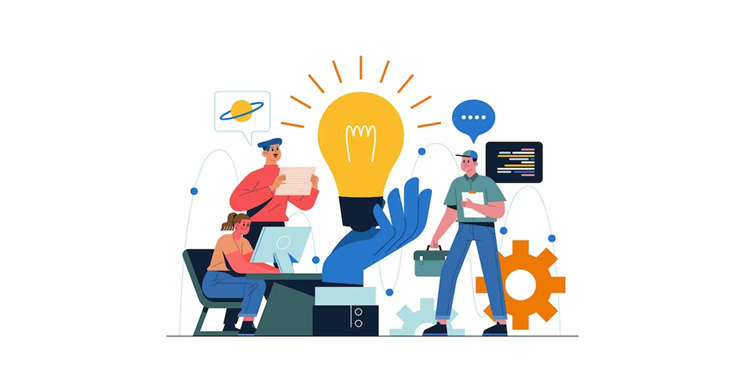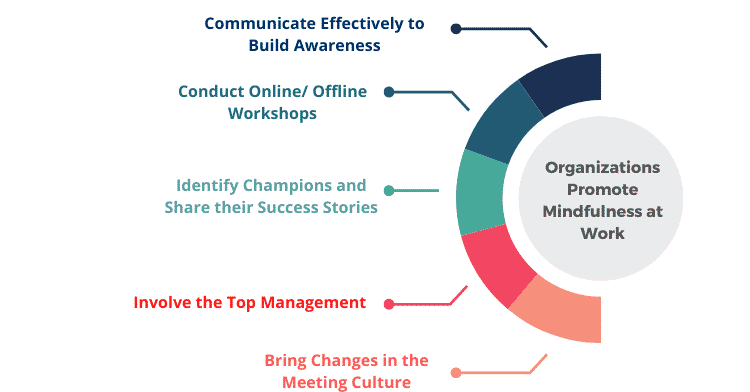What is Mindfulness?
Mindfulness is the practice of being fully aware and present in the moment without judgment. It involves heightened self-awareness and attention to one’s surroundings, promoting a calm and focused mindset.
Benefits to Organizations:
Mindfulness can reduce employee stress, burnout, and absenteeism, improving overall well-being and productivity. It fosters better workplace relationships, enhances communication and collaboration, and supports a culture of innovation by encouraging open-mindedness and adaptability.
Best Practices for Promoting Mindfulness:
Organizations should build awareness through effective communication, conduct online and offline workshops, identify mindfulness champions, involve top management in leading by example, and optimize meeting practices to reduce stress and enhance focus.
According to a ‘Health at Work’ survey, about 80% of employees reported being stressed at work and needing help managing it. A practical solution to this is mindfulness at work. More and more organizations across the globe are now focusing on and promoting mindfulness in their workplaces.

Simply put, mindfulness is being aware, paying attention to the present moment, and refraining from judging.
Interestingly, this concept has its roots in Buddhist literature and helps establish a heightened awareness about oneself and the environment around him.

From Google to General Mills to NHS; many organizations are preaching and practicing mindfulness at work.
Harvard School of Business has even included mindfulness principles in its curriculum for the leadership programs.
Therefore, the importance of mindfulness has only grown due to the onset of the COVID-19 19pandemic and the consequent remote working.
Practicing mindfulness provides benefits not only for individual employees but also has a positive impact on the entire workplace. Why mindfulness should be practiced at the workplace:

Organizations are focusing and investing more and more in their employees’ well-being, considering the increased costs of an unhealthy workforce.
These costs can range from poor productivity, high absenteeism, and even high turnover.
Therefore, organizations offer mindfulness training to enable employees to respond positively in difficult situations and not become victims of burnout, work stress, and appraisal issues.

Mindfulness at work helps in reducing stress, which is a dominant cause of employee disengagement and low productivity.
Hence, to combat this, prominent companies such as Google, Goldman Sachs, Adobe, Mayo Clinic, etc., have launched mindfulness programs that promote employee engagement and stress reduction.

The cornerstone for employee happiness is the healthy working relationship among peers.
Hence, this is particularly important at this time of hybrid working, which is stressful for the employees and their supervisors.

Also, employees can open their minds to absorb new information by taking a break from critical thinking or problem-solving.
Hence, organizations now offer mandatory leave to avoid employees dealing with excessive stress and stagnant thinking.
Here are a few ways how organizations can promote the practice of mindfulness at work:
1. Communicate Effectively to Build Awareness
2. Conduct Online/ Offline Workshops
3. Identify Champions and Share their Success Stories
4. Involve the Top Management
5. Bring Changes in the Meeting Culture


Initially, organizations should run online and offline campaigns to build awareness about practicing mindfulness and communicate its benefits.
Therefore, they should design these campaigns thoughtfully with images, videos, and infographics.
Digital platforms such as emails, intranet, Teams/ Slack channels, WhatsApp groups, etc. should be used effectively to communicate the importance of mindfulness.
Organizations can supplement this through posters, standees, tent cards, LED displays, etc., to reinforce the message for employees working from the office.

Additionally, the organization should enlist the services of experts to train employees in the practice of mindfulness.
Celebrity trainers can also be hired if budgets permit to generate greater employee interest.
The organization should also conduct training sessions virtually through video conferencing platforms for the benefit of those employees who are working from home.
They should also record these sessions and make them available on the intranet or the employee wellness portal if one exists.
Also, the organization should conduct offline sessions for in-office employees with the necessary Covid-related precautions.

Employees with high interest and involvement in mindfulness practice should be recruited as champions or ambassadors.
Hence, organizations should encourage them to share their success stories on various digital platforms within the organization.
Therefore, such positive experiences will likely inspire other employees to practice mindfulness.

Also, it is best to start at the top by roping in the top management to practice and preach mindfulness.
Mindfulness coaches/ experts can conduct personalized sessions for them.
The top management should not just practice mindfulness themselves but also promote it within the workforce in every possible forum.
They should share their personal experiences and the benefits that they have received.

Additionally, meetings can be a great source of stress, anxiety, and restlessness for employees.
Therefore, organizations should aim to increase the productivity of internal meetings by making them shorter, time-bound, agenda-driven, and limited only to participants who can add value to the meeting.
Hence, organizations should ensure that managers and team leaders are trained and coached to manage meetings effectively and turn them into ideal forums to practice mindfulness.
Mindfulness at work is an effective way to create a low-stress, highly productive, and positive work environment. Hence, organizations need to effectively promote its practice among the workforce.

Lead author: Sagar Chaudhuri, the Co-Founder and CEO of HiFives. He is an HR Tech Evangelist with over 25 years of corporate and entrepreneurship experience. In the past, Sagar has worked in leadership roles with companies such as Genpact, Infosys, and ICICI Bank. He has an engineering degree from IIT Kharagpur and an MBA from IIM Lucknow. Connect on LinkedIn
To stay updated on the latest HiFives blogs, follow us on Twitter (@MyHiFives)